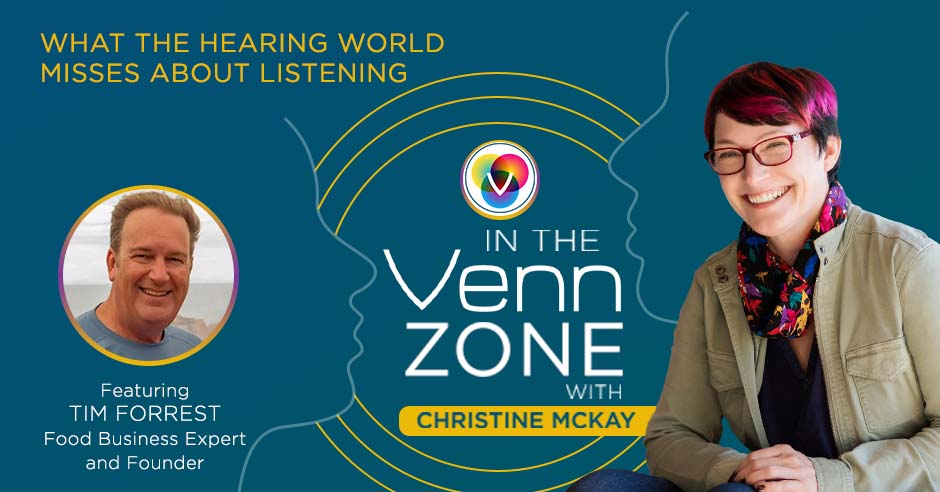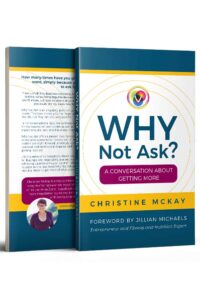
We sometimes take things for granted because we just get so used to having them. Take listening for example. In the hearing world, we miss out on fully utilizing our senses, which could have taken us further in our careers and life. In this episode, Christine McKay is with a special guest who sheds light on the things we lose out on because we fail to really listen. She is with Tim Forrest, America’s Top Food Business Expert and Founder of Tim Forrest Consulting. Born with congenital hearing loss, Tim shares the story of how he overcame the odds and built a successful practice using the incredible tools he has developed to be able to listen more intently and with more intensity. Join this conversation and be inspired to listen actively.
—
Watch the episode here
Listen to the podcast here
What The Hearing World Misses About Listening With Tim Forrest
I am so excited to be here with you guys. It’s been ages since I’ve done a show. For those of you who’ve been reading our posts, we’ve been talking a lot about the art of listening. I’ve worked with people who have had hearing impairment challenges and always observed that they have these unique ways of listening that I wouldn’t have necessarily thought of because I get to rely solely on my hearing. I had this thought that the hearing world is missing something that the hearing impaired get to pick up because they listen in a very different way.
I discovered that one of the most amazing people I’ve met in the last few years is hearing impaired and I had no idea. He was a guest on the show a few months ago and I would never ever have guessed or suspected even that he had suffered hearing loss for most of his life. He has some incredible tools that he has developed and adapted to be able to listen in an environment where he physically is challenged to hear.
I wanted to have a conversation about what that is and what can we learn from him from that perspective that we can take into our listening to be better at listening. I want to welcome back my friend, Tim Forrest, who’s amazing. Can you remind the readers of what it is you do because you are so good at what you do? You are genius and amazing.
Thank you. I began loading food trucks in school and was doing that to make it and finish university. Many years later, I’m still in the food industry. Loading trucks has been my career. I’ve had my own consulting company. Let’s go right back in and answer your question. I’m a consultant in the food industry. I help food brand owners and food entrepreneurs grow their businesses and achieve millions of dollars and thousands of new locations.
Many of them have become millionaires. They’ve become very successful. What I’ve done is take my systems and processes. I can meet someone that’s selling food on a little table in a farmer’s market. I will take my processes and work with them and we can grow their business. I met one of those people in a farmer’s market and they’ve done $66 million worth of product now.
That’s incredible. I told you guys he was a genius.
I appreciate you saying that. It is the processes and systems and what I’ve learned over the 35 years in all the businesses and systems I’ve worked with. I can tell you another one. We started a few years ago. He was a bartender and he had an idea for a product. He’s done $10 million in sales with his spice since 2018. He entered into the congressional record for his small business and they’re employing 50 people now.
Other products have done over $100 million. I’ve helped people turn businesses around and sell them for over $100 million dollars but it all began with me loading those food trucks. I learned the back doors of loading docks of all the channels in the food industry like club stores, restaurants, grocery stores, Major League baseballs, stadiums, airports, zoos, and theme parks.
From loading product from the truck in on the loading docks and going in the back doors of all these different channels, I ended up knowing so well how the business ran that it’s nothing for me to walk into a Major League stadium and get business for a food company. I understand the process. Also, because I did it from the back door, it’s so different than when you learn it. I did eventually.
I ended up working with the largest food brands in the world. I worked with Nestlé and Unilever for about a decade. They trained me on all their paradigms of being market leaders and everything you do to manage a market, understand your data, and all of that. Unlike so many of the other folks that I worked with, I had been on the loading docks. I’d come in the back door. It worked well.
Your career has been incredible and I watch you on social media. I watch what you do with your brands. We’ve had a number of conversations about it and it is truly remarkable. Tell us a little bit about how your hearing impairment affected you as you were developing or moving into your career and what that meant.
You’re curious about moving into my career. Let’s go back and define what my situation is. I was born with congenital hearing loss. It’s a cookie bite loss and I cannot hear the human voice, except for about 10%. I can make out 10% of the human voice. I’ve learned this over time. My brain attempts to fill in the spaces of what I’m missing. I don’t even know that I’m doing it, but I’m able to concentrate and I end up being able to make out what the conversation is usually with concentration.
We did not understand this when I was a child. I couldn’t speak because I couldn’t hear. Also, I had some learning disabilities from that as well. It’s over 50 years ago. We’re going back so far. They didn’t understand at the time. I was fortunate in that my parents were able to get me into the Atlanta Speech School for three years. That worked well enough so that I could learn to talk and speak but I never fully understood the hearing loss, how it impacted, was part, and played into all this. There were a lot of other things.
I wanted to do everything possible I could to forget that I ever went to the Atlanta Speech School. I buried it. I didn’t want to think that I had any issues. I wanted to be totally normal. I wanted to be like the other kids. I have to go ride on the bus across town and go to this special school. I did everything I could to forget and bury it. I forgot about it for many years until later in college. I started looking around thinking about my family when I was about to graduate and thinking, “How did all this happen?”
I realized it was the Atlanta Speech School dealing with those issues. That’s the situation that I faced but I never thought I had a hearing impairment because I buried it. I ran away from it. I did not understand the level that I had. Tracy and I got married in college. Every year, if not monthly, she’s like, “Tim, do you need a hearing aid?” I told her, “No, I do not.” I was not going to admit that I needed that.
Finally, I ended up going to three audiologists and going through the process. I have hearing aids now, which has been incredible and so exciting. To get to your question, I thought this is just the way I worked and operated as far as how I worked in business, sales calls, and food buyers. It’s real simple. I had to take notes. The first thing that I did, I discovered in college, I could remember anything that I took notes to. I couldn’t understand anything. I couldn’t remember anything if I didn’t take notes.
For some reason, I didn’t know if it had anything to do with my hearing but I would take notes. I’m a copious note-taker. I’ve been in business for more than 25 years. I’ve been in the food industry for many years, but I’m a copious note-taker. I fill up notebooks with notes. Once I take the notes, generally, I don’t need to refer back to them for some reason.
I remember all the meetings. I can remember one of my first million-dollar accounts of mine right after I graduated from school. Of the divisions I was working in, it became the largest client of that division. I can remember I’d worked on these notebooks for four days for this presentation. I got in there and my buyer looked at them and said, “Tim, I’m not going to read this book.” I may have told you about this in our negotiation and he slung it across the desk at me and said, “We’re not going to read this book.” He said, “Get out your notepad. Take notes here. We’re going to do these four things and take down the notes.”
I wrote down the four things we were going to do. I took down the notes. I said, “Yes, sir.” I went to work and came back. It took a period of time, but I took care of the four things he wanted to take care of. He bought over $1 million that first year. It became a major account over time. That is number one. I have to take notes. We talked about the number two thing before. Because of my dependency on active listening, I have to almost force myself to listen in order to comprehend. It’s difficult for me to get into any confrontation or any emotional situation when I’m listening.
I have to stay calm and keep the situation calm but I’ve always thought I’m not a good salesperson because of that. I can’t emotionally take the buyer somewhere but it’s ended up helping me with the professional buyers I deal with. I had all the sales tricks and sales books of this one when I was coming up, but I didn’t use those. I couldn’t use those types of methods. I became a consultative salesperson.
Everything I did was attempting to bring value, and also, it was laid out and planned ahead of time. I knew exactly what I wanted to do and go in. If something came up in the meeting, I’d have to leave the meeting to respond to it. I wasn’t that quick. Prior to the hearing aids, it was very difficult for me to be quick on my feet. It was something to do with my thinking or my brain. I wasn’t fast enough. I wasn’t smart enough to think on my feet.

It never occurred to me that my hearing impairment was part of the issue. I’m sitting there trying to listen, trying to hear the words, and trying to make out the words and fill in the blanks. I naturally do that. I’m losing that ability now with the hearing aids, but I naturally will fill in the words. If I get into an argument or get emotional, it doesn’t work.
I’ve heard so many things. One, you concentrate on listening. We talk a lot about how listening is a full-contact sport, essentially, and it takes more than just our ears to listen. You are listening and engaged. You’re physically engaged by taking notes. I love that you manage how you react emotionally by staying calm in situations so that your counterparts also can stay calm and they’re not getting overly emotional about something.
Listening is a full-contact sport. It takes more than just our ears to listen. Share on XI love that you naturally had to take anything and evaluate it after a meeting and come back to it. So often what I find with having my hearing is that I’ll have a tendency to react in the meeting and that doesn’t always serve me well. Being able to take that time to go, “I’ve got to go process this. I’ve got to go look at it,” gives you time to continue to control any emotional reaction. It gives you the ability to evaluate a proposal against your own objectives. When we are making decisions at the table, we don’t have that opportunity.
I had somebody text me and she is in the negotiation of a lifetime. She brought together two huge real estate investors and it has the potential for being a massive deal for her. She was like, “I’m so nervous. I don’t know.” I said, “Give yourself time to walk away. Don’t agree to something at the table. If it’s a big give, make sure you’re walking away.” That’s something that you did as a result of your hearing situation, but that you developed as a compensation mechanism that you didn’t even know you were compensating for that was super effective.
The other thing you mentioned is consultative selling. You and I are roughly the same age. The notion of consultative selling shockingly was being talked about, developed, and coming to the forefront a few years ago. Tons of people still don’t do it but you need to be able to listen to what your counterpart, your customer, or your client is trying to tell you. It elevates their level of importance in the conversation.

They feel like, “I have his full attention.” Often, we are allowing ourselves to get distracted. We start having a conversation in our own head and we’re not listening. All the things that you’ve talked about are things that I talk about and that we teach in our Negotiation 101 and VennMasters™ Program. We’re getting ready to launch a new program related to our book, Why Not Ask? It’s a Why Not Ask seminar that people can take on their own.
We’re dropping the audio version of the book and we’re going to release that program at the same time as the audiobook. What you’ve done naturally as a way of compensating because you’re like, “I’m not going to let this hearing loss impact me. I don’t have hearing loss.” You were fighting and we’ve talked before about how you fought. I used to feel this way for different reasons. It’s a bit of a chip on your shoulder to say, “To heck with this. I don’t care.”
You’ve built this incredibly successful practice by compensating and figuring out tools and mechanisms that give you the ability to hear more intently with more intent and with more intensity. As we were talking, we had a beautiful conversation. It was like, “I hope now that you have the hearing aids, you don’t lose some of that because it’s so valuable and integral to what you do and how you’ve built your success.” My reaction as I was going over our conversation was, “I hope he doesn’t lose some of those things.”
I was worried about that at the time. I think it’s only going to be a plus. I’m going to lose some of the ability as far as decoding language without the hearing aid, but the upside is so much greater and bigger. The other thing is talking with you, I’m remembering. Early on, I think of myself. When I was a kid, I was negotiating with Walmart on a massive commodity. It was a very aggressive negotiation. Right now, I’m realizing the reason I behaved the way I did.
During the negotiation with Walmart, the buyer at Walmart took my business card, wadded it up in his hands in a little ball, and threw it right in my face. He hit me in the face with it. I’m like, “What does that mean?” I didn’t let it faze me. I didn’t do anything. Number one, I did not bow to his demands. He was furious with us because of the position I was taking. It was wrong for us to go where he wanted us to go. We weren’t going to and it wasn’t right. I knew exactly what he was doing, but I held my guns.
I don’t think I would’ve ever done that had I not had my system of leaving a meeting before I take any major action. I do that so often. When he was trying to manipulate me in such a way to take action in that meeting, that would’ve been very negative for our company if I had taken the bait. The other thing is because of the way I listen, I’m confident that it creates incredible positive relationships for me for the people that I’m able to connect with and that I can get through my hearing issues.
By listening actively, you create incredible positive relationships and connect. Share on XIn my company, I have about twelve people on my board. The average tenure of the people on my board is 40 years. There are a couple of people on my board of advisors for my company that I’ve known for over 50 years. That’s part of it. I don’t fully understand it, but I do know it’s part of it. My roommate in college ended up becoming a Deputy Director of the FDA. I’m a consultant in the food industry, so it’s unbelievable. How could that have happened?
It was very fortuitous. We’ve reported everything. There’s an ethics department within the FDA. They fully know about our relationship and we had to go to them before he was an advisor to my company. Everything’s above board and it’s been very beneficial to have that relationship and have his advice, guidance, and friendship. At the same time, we’ve not done anything that’s in any way negative or would be considered negative. I know the way I develop relationships and friendships that hearing plays into it. I don’t fully understand it though.
I’m thinking about our relationship. We spent two hours on the phone getting to know each other at a much deeper level. It is such an honor to be able to do that. We’ve known each other for a while. What I see that you do very effectively and more effectively than a lot of people in the hearing universe is you’re so patient with people. You let people take their time. You let people come to you when they’re ready. You meet them partway.
You’re very comfortable drawing things out of somebody and it comes in part from how you have learned to listen and the incredible skill of listening that you have developed over your lifetime. It’s a huge benefit. It’s something that the hearing world can learn from. You have overcome that. You developed all these amazing tools that helped you grow into this amazing human being who’s done some amazing work.
Until our conversation, I’ve not understood. I’m friends with Amlan Ganguly in Calcutta, India. He was an attorney in India and became very dissatisfied with practicing law there because it is so unfair for people that don’t have the money to hire an attorney. He created Prayasam. In 2014, I reached out to him. I’m the Executive Director of Prayasam. I’ve helped build schools and done things there but I never understood one of the things that he shared. Amlan is a Ford fellow. He’s a part of The Rockefeller Foundation. Also, Adobe is one of its supporters.
He’s an incredible person. He’s an inspiration for me and is doing incredible work with the children in the slums of Calcutta, India. He’s from India. He is like, “Tim, you’re the first person that has come here who wants to help us.” He has asked a question, “What do you do?” You wanted to know, you asked a question, and you expected me to tell you how we do things and what we do. You’re interested in what our processes are.
Normally, particularly someone from America, if they’re going to do anything, they might donate some money or it has something to do with the finances and they walk away. You were the opposite. You asked questions and you wanted me to tell you and help you understand what it is we do here. I never thought about it in the context of our conversation but that is that process or that go-to technique that I use all the time to survive and that’s exactly what I did in India.
It’s incredible and the work that you’re doing in India is remarkable. I have loved this conversation and I hope that everybody reading has understood to learn the things that Tim shared and all the tools and tips that he shared. I am excited to see where you go next. I’m excited to help you get wherever you’re trying to go and do what I can to help you do that. What you do is special and you’re a very special person.
Thank you so much, Tim, for joining me to have this conversation. For everybody, remember that if you are blessed enough to have all of your hearing, understand that it’s not the case for everybody. Slow down and take time. These are things that are going to help you, whether you can hear or whether you have a hearing impairment.
Know that taking time, slowing down, listening actively, and being very focused and present in the moment with the people that you’re talking to is going to help you immensely in your negotiation. Happy negotiating and remember that negotiation is a conversation about a relationship. You cannot win a relationship, but you can get more value out of it. Thanks very much. Everybody, have a great day.
Important Links
About Tim Forrest
 Tim Forrest was introduced to food and CPG distribution, systems, processes, and branding while working on food loading docks in college. He then spent the next decade in executive sales and marketing roles for some of the world’s largest food brands, including Unilever and Nestle.
Tim Forrest was introduced to food and CPG distribution, systems, processes, and branding while working on food loading docks in college. He then spent the next decade in executive sales and marketing roles for some of the world’s largest food brands, including Unilever and Nestle.
He founded Tim Forrest Consulting in 1997, with initial projects for Rite-Aid Drugstores and an ice cream distributor on the island of Puerto Rico. Since then, Tim’s consulting projects have contributed to major successes for his clients, including many with 100%+ year-over-year growth rates.
